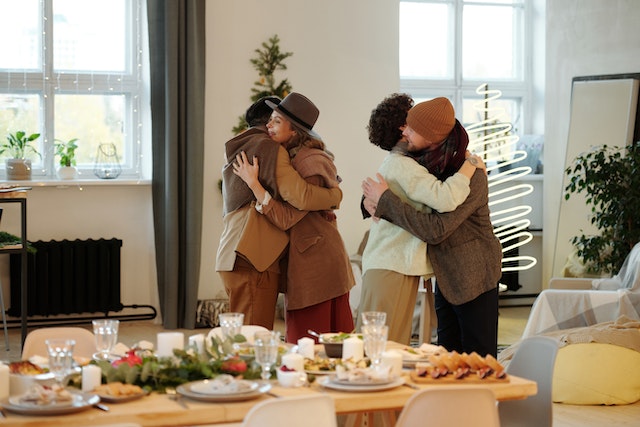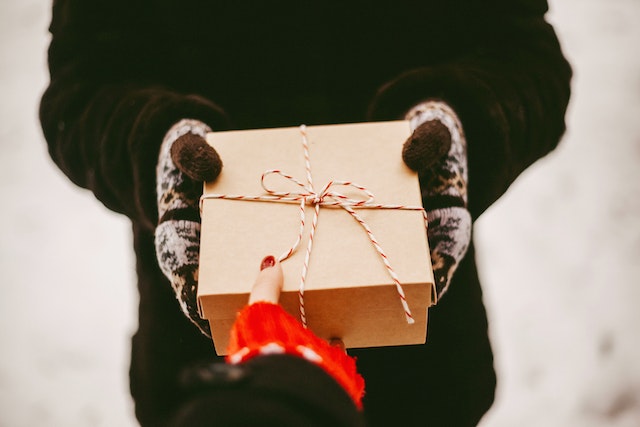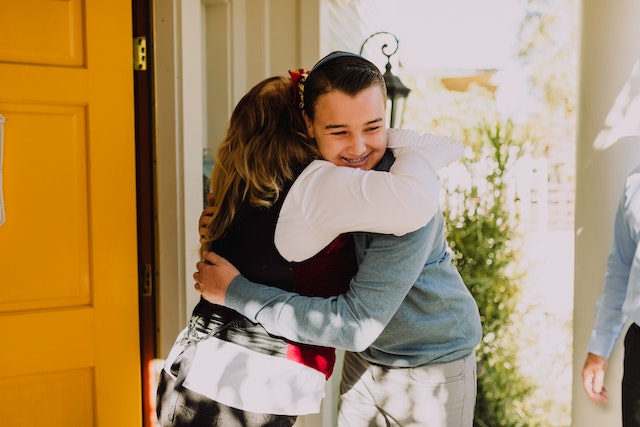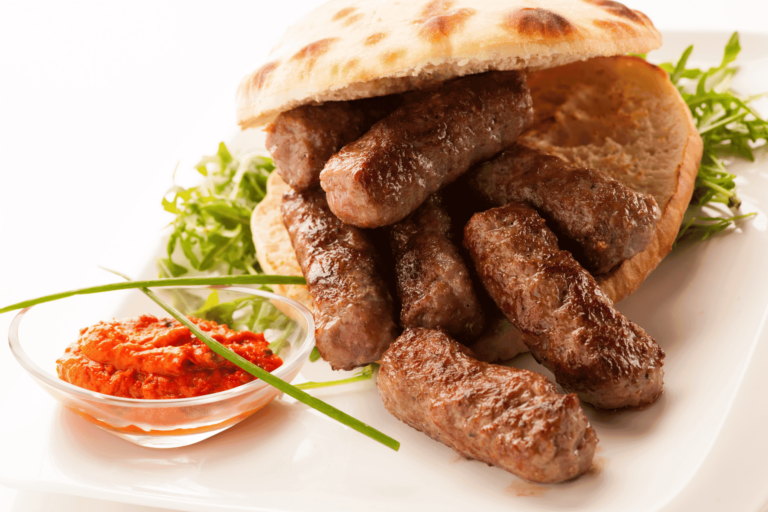Written by: Olivera Tolimir
If you’ve ever dipped a toe into Serbian customs and traditions, you must have heard about Slava. It’s well-known that every Serbian house has its patron saint. The most common patron saints in Serbia are Saint George (May 6th), Saint John the Baptist (January 20th), and Saint Nicholas (December 19th).
A family honors their saint on his feast day by gathering dear people, eating, and drinking. But Slava is a lot more than that. Did you hear about the ten facts you must know about it?
Serbian Orthodox Church uses the Julian calendar, which is 13 days late compared to the Gregorian, which we use every day. So, the Saint Nicholas we celebrate on December 19th is the same Saint Nicholas celebrated on December 6th in the West. Yes, the one that inspired the character of Santa Claus!

Pagan Roots
You probably know Serbs are Orthodox Christians. Since other Orthodox Christians don’t celebrate their family patrons, this custom makes us specific! But did you know Slava has pagan roots?
Back when Slavs were polytheists, every house had its deity. It’s said that Serbs were so adamant about continuing to worship their deities that Christianizing the tradition was the only way for them to let it go. We sure were stubborn and proud of our heritage since the old days.
It’s believed that the Serbian first archbishop Saint Sava, in the 13th century, helped Christianize the pagan celebration by turning it into the honoring of Christian saints. However, there is no proof for these claims.
Whatever the story behind its origin, Serbs nowadays love celebrating Slava! We’re not only proud of our uniqueness. We love the gatherings in the warmth of our home, being good hosts, and enjoying delicious food. And, of course, we appreciate a good glass of rakija. Well, guess what? Slava unites all of these! Plus, it brings the feeling of togetherness inside a family.
You Only Need Three Things
Serbs tend to make a big deal of organizing feasts for their Slava. It means they make as much food as they can. Some even go so far as to renovate parts of their house. But that’s not necessary.
There are only three things you need to celebrate this holiday:
- slavski kolač
- koljivo
- slavska sveća.
Slavski kolač (Slava’s cake/bread) is a special bread that has to be consecrated by a priest. The priest and the host rotate the slavski kolač three times, say the prayer, and then the priest breaks it and pours it with red wine. It’s usually decorated with edible shapes, such as a cross, book, grapes, or letters that symbolize Christ’s victory.
Koljivo (žito) is boiled wheat mixed with walnuts and honey/sugar. The priest also consecrates it by praying and pouring red wine on it.
Slavska sveća (Slava’s candle) is a long candle bought in a church that’s supposed to burn during the feast day.
Actually, one more thing should be in every Serb’s home for Slava. It’s an icon of their patron saint. It should be placed in the living room or in the dining room. Kandilo is hanged in front of the icon. It’s a type of candlestick into which we pour some water and oil. Then, we light a small fire. It serves to illuminate the icon during the Slava. It stays lit during Slava, just like the Slava’s candle.
When you arrive as a guest, don’t forget to try koljivo. Usually, it will stand on the table or close to the entrance. Sometimes, a host or host or hostess will bring it to you on a plate.
There’s a correct way to serve and try koljivo. If you don’t know it, you might get confused. The wheat dish is served with two glasses next to it. One has only clean teaspoons, and the other is filled with water and meant for used teaspoons.
When trying koljivo, make the sign of the cross with your right arm and take a spoonful. Then, try it and put your used teaspoon in the glass of water. If you’re not a Christian or a believer at all, it’s all right to simply take a spoon of the dish without making the sign of the cross.
Food: Lenten or Mouthwatering?
As we’ve already said, Serbs try hard to be perfect hosts. They make tons of different kinds of food. But there’s one limit regarding the type of prepared meals. If our saint’s day falls during the fasting period, we choose groceries accordingly. This is called posna (lenten) Slava.
Fasting for the Orthodox Christians means restraining of eating anything of animal origin except fish and honey. So, we prepare fish soup, fried fish, potato salad and cakes made without milk and eggs.
If Slava is mrsna, we can prepare any meal we like. There’s usually meze (a plate with different kinds of ham, cheese, and other finger food), chicken soup, sarma, roast pork or lamb, Russian salad, and various cakes.
Some people are so excited about the feast that they forget the essence of the celebration. So, they prepare pork even during the fasting period. It’s a big sin according to the church rules. Besides, lenten food can be at least equally (if not more) delicious as mrsna!
Also, most people nowadays consider Slava an opportunity to eat delicious food, drink (sometimes even get drunk!), and hang out. It’s not an issue per se, especially today, when people are getting less and less religious. But be careful not to cross the line of fine taste. It’s perfectly all right (and encouraged) to laugh, enjoy, and be (somewhat) loud during Slava.
But don’t make inappropriate jokes or get wasted. Drink a few glasses of your favorite drink and stop. Slava is a family holiday and should be respected as such. It’s not a birthday or New Year’s Eve to go out with friends and drink.
The hosts (especially the hostess) worked hard to prepare everything and make it possible for all guests to relax and enjoy. The least guests can do is to show basic respect. Unfortunately, there is sometimes that one uncle who can’t seem to grasp the concept. Don’t be that uncle.
I Don’t Wanna Work Today
Did you know that every person in Serbia has a day off for their Slava? This holiday is of great importance for every Serb. Most of us are very busy from the early morning on this day. We have to go to church, pick up the roast, arrange the table, prepare meze and welcome our guests!
All the listed tasks would be impossible to achieve if we had to work from 9 to 5 that day!
Don’t Show Up Empty-Handed!

This one is plain and simple – always bring a gift when you come to Slava! A gift for this occasion usually consists of a bottle of wine, 200 grams of coffee, and a bar of chocolate. If hosts have more children, bring a bar of chocolate for each of them!
People sometimes also buy flowers for the hostess. If you want to take an extra step, you can order personalized wooden boards with the carved last name of the family you’re visiting or their patron saint. Thoughtful gifts also include a set of glass rakija glasses and a bottle with a picture of the family’s patron saint or a simple inscription “Srećna slava”.
Bear in mind that no one expects this, and people usually do it for their close family and friends. Bringing a bottle of wine, chocolate, and coffee is more than enough.
Not Being Invited
What would you say if we told you it’s fine to show up to your friend’s door with a bottle of wine for their Slava even though they never called you? You’d probably say it’s very rude and you would never do such thing! Well, good news: you’d be wrong!
Here’s a fun fact: Serbs like to say, Na slavu se ne poziva? It means that we don’t invite guests to Slava. Instead, those close to us already know when and where to come. So, if someone invites you once, they probably assume you’ll show up at their door to celebrate their patron saint with them every year.
But also, keep in mind the life circumstances of the family you’re visiting. If they skip the invitation one year, and you know their close family member died or they’re moving, don’t assume they’ll celebrate like the year before. It’s all right to ask them about their plans.
Also, younger generations often don’t follow the “it’s implied you’re invited forever” rule. They’ll probably invite you every year. Sometimes for no other reason but to tell you at what time to come!
But if a close friend doesn’t invite you one time even though everything else is fine, it’s safe to assume their default setting is “you know when and where to come”.
Srećna slava, domaćine!

When we arrive at our hosts’ house, we congratulate them by saying, “Srećna slava, domaćine!” It means, Happy Slava (holiday), host! To the hostess, we say, “Srećna slava, domaćice!”
Then we give them a gift, handshake, and kiss them three times on the cheeks. Don’t forget – three times is a must! Kissing three times is another thing characteristic for Serbs, aside from Slava.
Like Father, Like Son
Slava is a family heritage. It’s traditionally transferred from father to son (yes, it’s an old patriarchal thing).
While kids are small, it’s easy. But what happens if your friends have an adult son and daughter? Do they still celebrate with their parents?
It depends. If children live with their parents, the answer is yes. If a daughter is married, she usually adopts her husband’s patron. Sometimes families celebrate both husband’s and wife’s Slava. Very rarely they choose a third, different Slava for their family. If a daughter is single, she still honors the same saint as her parents.
The rule is that when a son gets married, the first Slava following his wedding is the last he celebrates with his parents. Traditionally, the father gives the son a piece of Slava cake and wishes him luck celebrating with his new family.
However, many families don’t do it this way. The adult married children often come with their spouses as guests to their parents’ Slava until the father decides to pass it on.
Patrons of Schools & Towns
Do you know families aren’t the only ones to have their patron saint? A lot of cities, villages, and institutions have Slava, too.
For example, Saint Sava is a patron of all schools, teachers, and students. He’s honored in every school in Serbia on the 27th of January. Saint Sava was our first archbishop, enlightener, and original author! He is a significant figure in Serbian culture and history. The Temple of Saint Sava in Belgrade is one of the largest Orthodox Christian churches in the world.
Belgrade also has its own Slava! It’s Spasovdan, and it’s celebrated every year on Thursday, 40 days after Easter. Christian believers celebrate it as a day when Jesus Christ told his followers to preach the Gospel and ascended to heaven. Spasovdan is Belgrade’s Slava because the Serbian ruler Stefan Lazarević proclaimed Belgrade a Serbian capital in 1403.
Also, many other towns and villages have a Slava. They celebrate it by organizing fairs and activities for all residents to enjoy.
UNESCO’s Register
In November 2014, UNESCO officially recognized the importance of the Serbian Slava, so it became a part of its List of Intangible Cultural Heritage. We’re pretty proud of this fact!
What customs have you already known about? Which ones do you find the strangest?
Do you want to be sure you know everything about a Slava before going to one? Book a lesson with one of our teachers to never feel lost and confused at a Slava again!



